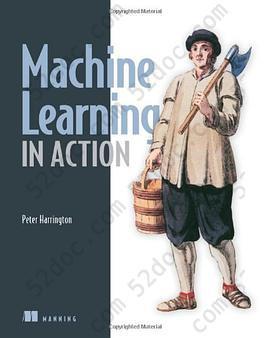注重体验与质量的电子书资源下载网站
分类于: 互联网 设计
简介

Machine Learning in Action 豆 8.5分
资源最后更新于 2020-09-27 15:06:22
作者:Peter Harrington
出版社:Manning Publications
出版日期:2012-01
ISBN:9781617290183
文件格式: pdf
标签: 机器学习 MachineLearning 数据挖掘 python 人工智能 Python 计算机科学 算法
简介· · · · · ·
It's been said that data is the new "dirt"—the raw material from which and on which you build the structures of the modern world. And like dirt, data can seem like a limitless, undifferentiated mass. The ability to take raw data, access it, filter it, process it, visualize it, understand it, and communicate it to others is possibly the most essential business problem for the co...
目录
Part 1: Classification
1 Machine learning basics
2 Classifying with k-nearest neighbors
3 Splitting datasets one feature at a time: decision trees
4 Classifying with probability distributions: Na�ve Bayes
5 Logistic regression
6 Support vector machines
7 Improving classification with a meta-algorithm: Adaboost
Part 2: Forecasting numeric values with regression
8 Predicting numeric values: regression
9 Tree-based regression
Part 3: Unsupervised learning
10 Grouping unlabeled items using k-means clustering
11 Association analysis with the Apriori algorithm
12 Efficiently finding frequent itemsets with FP-Growth
Part 4 Additional tools
13 Using principal components analysis to simplify our data
14 Simplifying data with the singular value decomposition
15 Big data and MapReduce
1 Machine learning basics
2 Classifying with k-nearest neighbors
3 Splitting datasets one feature at a time: decision trees
4 Classifying with probability distributions: Na�ve Bayes
5 Logistic regression
6 Support vector machines
7 Improving classification with a meta-algorithm: Adaboost
Part 2: Forecasting numeric values with regression
8 Predicting numeric values: regression
9 Tree-based regression
Part 3: Unsupervised learning
10 Grouping unlabeled items using k-means clustering
11 Association analysis with the Apriori algorithm
12 Efficiently finding frequent itemsets with FP-Growth
Part 4 Additional tools
13 Using principal components analysis to simplify our data
14 Simplifying data with the singular value decomposition
15 Big data and MapReduce







